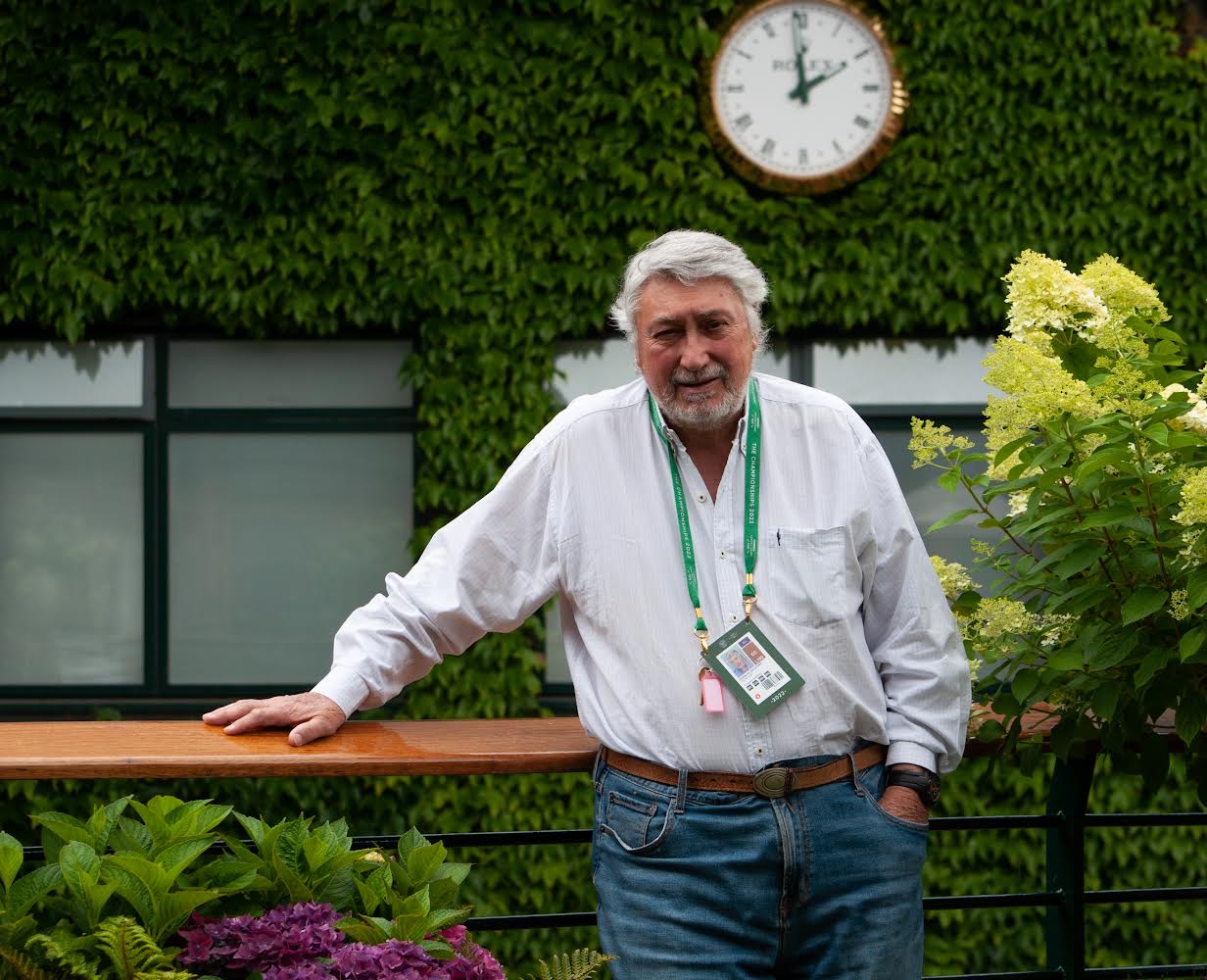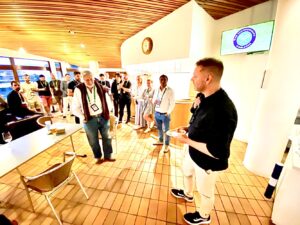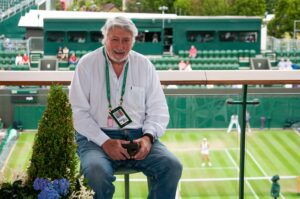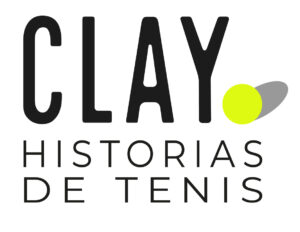
Guillermo Salatino and the end of a fabulous saga that spans 45 years and 147 Grand Slams: “Tennis has fed my good ego”
LONDON – It’s not the retirement of a great tennis player, but it is the endpoint for a great tennis star. He is 76 years old and spent the last 45 years travelling the world to cover 147 Grand Slams. The first one was Wimbledon in 1977 and the last one is now, Wimbledon in 2022. If Guillermo Vilas, popularized tennis in Argentina, another Guillermo, Salatino, was pivotal for those who loved Vilas, Gabriela Sabatini, José Luis Clerc, David Nalbandian, Guillermo Coria, or Juan Martín del Potro, to understand what happens in that rectangle that can be orange, green and many other times blue.
“Tennis has treated me very well, it has fed my good ego,” Salatino emphasizes during an in-depth dialogue with CLAY at the All England Club (AELTC). It’s his farewell and countless colleagues have come to embrace him and pay tribute. On Wednesday night, The International Tennis Writers Association (ITWA), of which he was vice-president, and a founding member gave him a trophy and as he received the applause of senior tournament officials and colleagues from around the world.
“Salata”, as he is called by many in the tennis world, is excited about these last days of tennis in Grand Slam tournaments, but also because the memory of Alejandro comes up. His son, who died in May 2010 from a tumor located behind one eye. This event marked a before and an after for Salatino. He never stopped working, but he was never the same.
“If you ask me if I mourn him, I’ll say no because we talk every night. Every night I dream that we are both together playing golf.”
The tragedy hit the whole family hard, but for Alejandro’s father, it was especially difficult.
“When Alejandro lost his eye, I had a heart attack and I had to have surgery with 4 stents. And when he died, soon after, I had another heart attack. So, for my wife María Angélica, it was like a train had run her over.
Salatino does not let a day go by without thinking about his son. “I am so proud of what he left behind, of his friends, the years go by, and they keep calling me for his birthday. I didn’t know who he was professionally because at home we never spoke about work, had different perspectives and we fought a lot.”
“The day after his death I had to broadcast a tennis tournament, it was right after a Formula 1 broadcast, which Alejandro had been executive producing, and which was dedicated to his memory.”
“‘Are you going to be able to talk,’ Gustavo Luza, with whom I shared the broadcast, asked me. I pulled out all my strength and did it, I felt it was what he would have wanted me to do.”
Fortunately, life smiled at Salatino in other ways. At the age of 30, he rebelled and left his father’s importer and customs broker business devoted himself to studying sports journalism and took advantage of the opportunities given to him by two Argentine tennis heavyweights: Mario Posse Romero and Fernando Marín. Salatino had played tennis at a very good level at the Buenos Aires Lawn Tennis Club (BALTC), one of the most traditional clubs in the country and even won the mixed doubles of the Abierto de la República with Beatriz Araujo.

This article’s author presenting the ITWA award to Guillermo Salatino / SEBASTIÁN VARELA NAHMÍAS
Salata’s eyes sparkle when he remembers the turn his life has taken. Today he could be living a comfortable retirement after inheriting his father’s company, but instead thanks to that youthful spirit and passion for tennis that courses through his veins, in the press bar at Wimbledon. It’s his 43rd Wimbledon: “That’s 43 Wimbledons, 43 Roland Garros, 43 US Opens and 18 Australian Opens”, he only missed the All England in 1982, because of the Falklands War, and two years because of the covid-19 pandemic.
“Dad, I’m not coming anymore,” he told his father in 1976 when he announced that he was leaving that day-to-day life at Customs, which he hated, among other things because the job included bribing employees.
“You’re crazy, you have two children!”, Salatino implored.
“I’m going to earn much more money and I’m going to do what I like. I’m leaving,” Salatino junior said.
“And I graduated three years later from the Círculo de Periodistas Deportivos along with journalists like Alejandro Fabbri, Luis Vinker, Oscar Pinco…”.
Salatino cannot deny that he was lucky. His first tournament was Wimbledon ’77, but the second one, the US Open that same year, saw Vilas clinch the title. And he was there to tell the tale, as was another legend of tennis journalism, Juan José Moro.
“It was my first satellite broadcast; we did 52 rating points on tape delay.”
“Delayed?”
“Yes, there was only one satellite, and as we Argentines always do everything at the last minute, on Friday we decided to broadcast the semi-finals and the final, but it wasn’t possible. They told me to arrange everything. But on the Sunday that Vilas was playing the final, at the Boca and Cruzeiro were also playing, and Galíndez, a great boxer, was fighting for the title.”
“There was a program called ‘300 million’, and they had the satellite. So, with Vilas at equal sets and 3-0 up against Jimmy Connors, they cut the transmission. We recorded and played it at eleven o’clock that night. I couldn’t go to Vilas’ celebration because I had to make sure that everything arrived safely in Buenos Aires”.
Salatino states that he has the peace of mind that he is “well-known, but not famous”, and laughs when someone tells him, that because of his constant travels around the world, many people think of him as a “bon vivant”.
“You really are a bon vivant… but I laugh. I tell them I am because at home I live like a king, but when I travel, I work 12 or 13 hours a day. At Flushing Meadows I left at four o’clock in the morning during many years when I also wrote for the DPA, so I could follow Rafael Nadal’s performances”.
His stay at Wimbledon has, admittedly, very little of what one would expect from a bon vivant.
“In my last tournament I’m sharing not only an apartment… I’m sharing a bed! We rented an apartment via Airbnb with my colleague Daniel Miche and discovered there was only one bed… What were we going to do? I end my career travelling economy and sharing a bed with a man. Back in the days when I was sent as a special envoy, my contract stipulated I flew business.”
Salatino, a tall and burly man who hardly fits in economy class seats, made a cult of travelling the world while keeping expenses to a minimum. That even led him to share a hotel room with four people, but there was always a device that travels with him around the world and regulates his breathing while he sleeps.
“In Rome I stayed at the Pensione Erdarelli for 15 years. You went through a tiny door, then through a long corridor, it was a long house, and you were greeted by a 70-year-old couple. The rooms had five-meter ceilings, they were huge but dirty, and they were falling down because they were unpainted. Of course, it was fantastically located just 150 meters from Piazza Spagna, but so miserable that when you got to your room, the cockroaches would say ‘buonasera’ to you.”
“It’s true that I’ve also stayed in great hotels, like the Mauna Lani Bay in Hawaii, which had a shark swimming in the lobby.”
If you look at yourself, what do you see? Who do you think Guillermo Salatino is?
“To me, it always struck me that 90 percent of people call me “maestro”. Why? It must be because I’m a big guy, I look serious, although they don’t know me. I’m a grumpy old man with a sense of humor.”
“I tried to make people understand more about tennis, I think I succeeded, although I feel much more recognized in Latin America than in Argentina. It never ceased to amaze me that Fox left tennis and they didn’t call me from ESPN. Am I that bad, I thought to myself? Maybe I’ve gone out of fashion, we’ll have to modernize…”.

Guillermo Salatino, at Wimbledon 2022, his last Grand Slam tournament / SEBASTIÁN VARELA NAHMÍAS
Is it the end? Will Salatino never again be heard talking about tennis?
“Nooooo… This is a retirement from travel, but I will continue as a tennis commentator. The day I stop working is the day I die. This keeps me active. I’m not an old, retired guy, even though I really am. And if they call me to do television, I’d do it.”
“But I don’t want to travel anymore because of family. The pandemic helped me. One is a bit like an athlete perhaps, the fear of retirement, of the day after. I see Australia, Monte Carlo, Rome, tournaments I haven’t been to for a few years now, and I tell myself I should be there. I watched Wimbledon and Roland Garros on TV during the pandemic, and I realized that I was comfortable, I was ok with it. My wife is grown up, I’m grown up, my daughters don’t want me to travel anymore.”
“The ambition to be the best version of myself made me neglect my family. I’ve had two-and-a-half-month trips. My advice to young people is to take care of the family, and never leave home for more than 15 days. When Alejandro turned 18 I asked him what he wanted me to bring him from Europe, and he said ‘I want you, old man’. It disarmed me.
There is no need to ask him about Gabriela Sabatini or ask him to describe her. “She’s a different category,” he sums up.
But he there are other names very close to his heart, among many tennis players he followed around the world.
“Mercedes Paz, Mariano Zabaleta, Guido Pella… And Gaudio I have loved him very much. He’s a much better person than people think. But he is very special. And Coria is another great person. There are others that I loved very much, but they have disappointed me. I was very close to De la Peña when he started”.
There were also quarrels, resounding quarrels.
“I have clashed with very few, but I did clash with the three best players Argentina has produced. With Vilas, Del Potro and Nalbandian, but all three were to blame. I made peace with all three. Guillermo was the one who called when Alejandro died. We hadn’t talked to each other for 20 years. Nalbandian got angry because of criticism I shared on TV and Del Potro left me hanging on a TV show, Sin Anestesia, when we had agreed to do an interview”.
Salatino pauses, thinks for a while, and then says: “I think the golfer is better than the tennis player. He is less selfish when someone else wins he is happy. The tennis player, very rarely. In tennis, you play against another person; in golf, it’s against the terrain”.
The best tennis match you ever saw in your life? “Becker versus Sampras in the 1996 Masters. I watched it on TV, I was in New York because of Gaby’s (Sabatini) retirement. I think it’s the best thing I’ve ever seen in my life.”
When you mention Sabatini, he can’t contain himself.
“Our two best tennis players were never number one and they were both the best. What doubt is there that Vilas was the best winning 16 titles, two Grand Slam titles, playing the final of a third, winning the Grand Prix in ’77… Although the numbers say that in ’75 he was closer, ’77 was his best year.”
“And Gabriela went two years without losing to Graf and dominating Seles, who was number one. She was in Berlin and Wimbledon two points away from being number one. How can it be that Dinara Safina was number one and Bartoli is a Wimbledon champion…? It sounds very unfair. But on the other hand, Gabriela played in the best period of women’s tennis. They were many and all very good.”
“I accomplished the goal,” he sums up as he refocuses on her career. “And I helped my three daughters so they could each buy their own house. Financially I have to keep working.”
“But I fulfilled the objective -he insists-, I think I am someone in international journalism. More than in the Argentine one. I am in the elite of tennis journalism worldwide. But I have never been invited to a Martin Fierro ceremony (Argentine television awards). I chose not to be a pimp or a panderer”.
Salatino remembers the legendary Italian journalist Gianni Clerici, who died a few weeks ago at the age of 91.
“Gianni would come looking for me at tournaments to watch doubles. He was the one with whom I talked the most about tennis. One day he told me, I don’t know anyone with your memory, if you don’t write a book when you die, I will say that a great selfish man has died. That’s why I wrote a book, ‘The Seventh Game’.”
Salatino, is a “top five” in terms of tennis coverage, which is measured by the number of Grand Slam tournaments covered. Just like Rafael Nadal, Roger Federer, and Novak Djokovic measure in their battle to make history
“In terms of the number of Grand Slams covered Richard Evans surpassed me. Gianni had 200, Rino (Tommasi) had many, I must have been sur passed by Ubaldo (Scanagatta), Zubi (Miguel and Angel Zubiarrain), maybe. But some people lie.”
“It fills me with pride to have my seat at the Wimbledon headquarters since 1977. It is a prize for having come 40 years in a row. Truthfully I have been treated very well by tennis, it fed my good ego.”
Is there a successor? Salatino keeps thinking. And the answer turns into a long debate about media, tennis, and journalism or simply put about his life.
Si estás leyendo esto es porque te gusta el tenis y disfrutas con el periodismo que hacemos. Si puedes y quieres colaborar, invítanos un KOFI para que podamos seguir contando las mejores #HistoriasDeTenis por el mundo.




